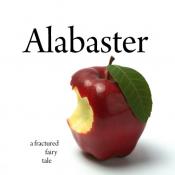|

|
Alabaster
by John Cater, Rob Dubbin, Eric Eve profile, Elizabeth Heller, Jayzee, Kazuki Mishima profile, Sarah Morayati, Mark Musante profile, Emily Short profile, Adam Thornton profile, and Ziv Wities
Part of fractured fairy tales
Fairy tale
2009
Web Site
|
Go to the
game's main page
Member ReviewsNumber of Reviews: 9
Write a review6 of
8 people found the following review helpful:
 Nutritious Fare, December 12, 2009 Nutritious Fare, December 12, 2009Normally I'm a fan of fairy tales and conversational games both. Games like Alabaster are my bread and butter. Alabaster itself incorporates a handful of technical features which are worth exploring by anybody. But I experienced a kind of dissonance between those welcome features and certain aspects of the story, so my five-star rating is subject to personal tastes both for and against.
On the conversation side, the parser seems to encourage inserting more than a simple keyword after ASK ABOUT. Though that is not in fact true -- the "keyword" now comprises multiple words resembling a dependent clause -- the illusion improves the immersiveness of the experience a surprising amount. Moreover, my immersion-breaking "what would the parser understand" analytics have turned off again by the time I finish typing the command. The effect is a little like snowboarding down a tree-infested slope: I'm generally enjoying the ride and playing around with little thought to consequence, but I must periodically make clear and distinct decisions about what route to take to avoid disaster. I believe the reason the brief parser analyses don't mar Alabaster's ride is because I've already returned to the ride before I've finished typing in my response. Bizarre but true.
This doesn't mean I endorse the near-constant need for prefixing ASK HER to my input. I found this distancing. Apparently S&W's maxim of "omit needless words" applies to inputted commands as well. Paradoxically, while I'm aware that I can abbreviate the afore-mentioned dependent clauses a great deal, doing so decreased my enjoyment. Apparently parsers love needless words, and the words the parser does not need -- all those IFs, ISes, and WHATs -- are very important to me, the player, and my sense of immersion. So which words are "needless" greatly depends on whose point of view you're considering, human or computer. (Of course if Alabaster were more action-oriented, I don't know if any of this would still hold true.)
The illustrations work better than I imagined. I'm something of a purist when it comes to inserting multimedia elements into interactive fiction. I prefer the prose handle all jobs. But though the depicted character doesn't match my own idea of Snow White, it still worked for me. More instructively, the procedurally-collated image informed me of emotional tones in the work that interactive text struggles with. My only addition would be to grey-out or fade the image when I use a out-of-world command.
Usage of the THINK command is inspired: an "inventory" of events and plot points so far. But I can't seem to THINK ABOUT any one of them in particular, not even as a memory aid, which is distressing. If taken together, this is the kind of thing that should be automatically included in all works, rather than nitpicky details about whether one is sitting or standing. Likewise the ENDINGS command: since it's saved to an external file, it can reify any take-home value of the story. Alabaster only uses it as a checklist of sorts for completionists, but I feel that there's untapped artistic potential there.
The one thing I found unpalatable is the general what's-going-on tone the story uses. Interactive fiction is opaque enough as-is, and especially so when the work is in any way progressive. The player isn't sure of the commands or the way the game works. The player already asks himself "what's going on" just with the interface, parser issues, and keeping track of everything important -- which usually means everything until he knows enough of the boundaries and intent of the work to guess at what is and isn't worth remembering. How can I choose my own destiny and thwart my opponents if I'm the most clueless person in the room? Alabaster has an agency problem.
Still, it isn't empty calories. Play Alabaster. It's chicken soup for your experimental soul.
|
 Nutritious Fare, December 12, 2009
Nutritious Fare, December 12, 2009